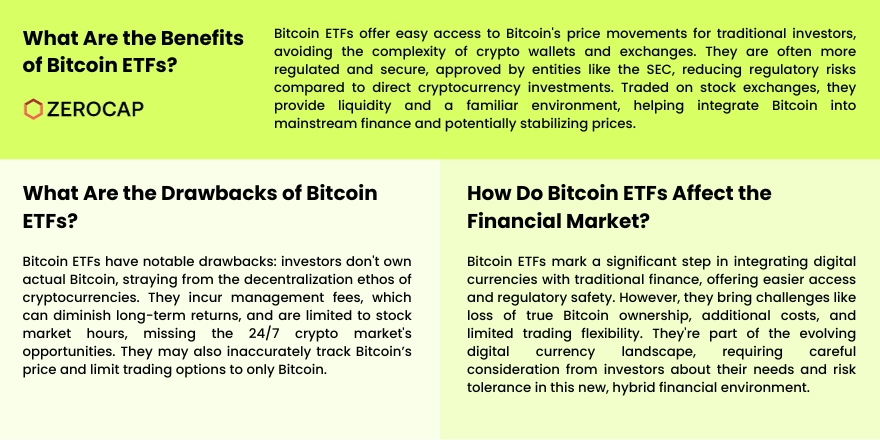8 Jan, 24
Pros and Cons of a Bitcoin ETF

The financial world has been abuzz with the concept of Bitcoin Exchange-Traded Funds (ETFs). A Bitcoin ETF represents an innovative blend of digital currency and traditional investment vehicles, offering a new avenue for investing in Bitcoin. It’s critical to explore the bitcoin ETF pros and cons, as this investment option merges traditional finance with the emerging world of cryptocurrencies, impacting both sectors significantly.


Simplified Investment and Accessibility
One of the biggest advantages of Bitcoin ETFs is the simplified access they provide to Bitcoin. Investors can gain exposure to Bitcoin’s price movements without purchasing the cryptocurrency directly, avoiding the technical complexities of crypto wallets and exchanges. This ease of access is particularly appealing to traditional investors and those new to cryptocurrencies.
Regulatory and Security Benefits
Bitcoin ETFs, especially those approved by regulatory bodies like the U.S. Securities and Exchange Commission (SEC), mitigate some regulatory risks associated with cryptocurrencies. They offer a higher standard of reliability and security compared to direct cryptocurrency investments, reducing concerns about wallet security or cyber-attacks.
Market Integration and Liquidity
Bitcoin ETFs are traded on traditional stock exchanges, providing liquidity and a familiar trading environment for regular investors. They also present an opportunity for institutional investors, further integrating Bitcoin into mainstream financial markets. This integration can lead to increased market liquidity and potentially more stable prices in the long term.
Diversification and Tax Benefits
Investing in a Bitcoin ETF allows for diversification within investment portfolios. Some Bitcoin ETFs include not only Bitcoin futures but also stocks, offering balanced investment options. Furthermore, certain Bitcoin ETFs regulated by the SEC may be eligible for tax efficiency, providing additional financial incentives.
Challenges and Considerations
Despite the advantages, there are several challenges associated with Bitcoin ETFs:
- Control and Ownership: Investing in a Bitcoin ETF means you don’t own actual Bitcoin. This contradicts the decentralization principle of cryptocurrencies.
- Cost Implications: Bitcoin ETFs come with management fees and operational costs, potentially reducing net returns for long-term investments.
- Market Hours Limitation: Unlike the cryptocurrency market, which operates 24/7, Bitcoin ETFs are limited to the stock market’s operational hours. This limitation can result in missed opportunities due to Bitcoin’s round-the-clock price fluctuations.
- Tracking Errors: Bitcoin ETFs aim to replicate Bitcoin’s price movements, but discrepancies known as tracking errors can occur, leading to potential misalignments with the actual market performance of Bitcoin.
- Limited Trading Options: Bitcoin ETFs only track the price of Bitcoin and cannot be traded for other cryptocurrencies, limiting investors’ ability to quickly trade and adapt to market trends.

Conclusion
The introduction of Bitcoin ETFs marks a significant milestone in the fusion of digital currencies with traditional investment frameworks. They offer benefits such as simplified access, regulatory safety, market integration, and diversification. However, investors must weigh these against the downsides like loss of true Bitcoin ownership, higher costs, market hour limitations, tracking inaccuracies, and limited trading flexibility. Ultimately, Bitcoin ETFs represent just one of many pathways in the evolving landscape of digital currencies, and investors must carefully consider their specific needs and risk tolerance when choosing to invest in them.
FAQs
- What is a Bitcoin ETF?
- How does a Bitcoin ETF differ from owning Bitcoin directly?
- Are there different types of Bitcoin ETFs?
- What are the key advantages of investing in a Bitcoin ETF?
- What are the main challenges associated with Bitcoin ETFs?
- Main challenges include the absence of actual Bitcoin ownership, higher management and operational fees, limited trading hours compared to the 24/7 cryptocurrency market, potential tracking errors between the ETF and actual Bitcoin prices, and the inability to trade the ETF for other cryptocurrencies.
About Zerocap
Zerocap provides digital asset liquidity and digital asset custodial services to forward-thinking investors and institutions globally. For frictionless access to digital assets with industry-leading security, contact our team at [email protected] or visit our website www.zerocap.com
DISCLAIMER
This material is issued by Zerocap Pty Ltd (Zerocap), a Corporate Authorised Representative (CAR: 001289130) of AFSL 340799. Material covering regulated financial products is issued to you on the basis that you qualify as a “Wholesale Investor” for the purposes of Sections 761GA and 708(10) of the Corporations Act 2001 (Cth) (Sophisticated/Wholesale Client). This material is intended solely for the information of the particular person to whom it was provided by Zerocap and should not be relied upon by any other person. The information contained in this material is general in nature and does not constitute advice, take into account the financial objectives or situation of an investor; nor a recommendation to deal. Any recipients of this material acknowledge and agree that they must conduct and have conducted their own due diligence investigation and have not relied upon any representations of Zerocap, its officers, employees, representatives or associates. Zerocap has not independently verified the information contained in this material. Zerocap assumes no responsibility for updating any information, views or opinions contained in this material or for correcting any error or omission which may become apparent after the material has been issued. Zerocap does not give any warranty as to the accuracy, reliability or completeness of advice or information which is contained in this material. Except insofar as liability under any statute cannot be excluded, Zerocap and its officers, employees, representatives or associates do not accept any liability (whether arising in contract, in tort or negligence or otherwise) for any error or omission in this material or for any resulting loss or damage (whether direct, indirect, consequential or otherwise) suffered by the recipient of this material or any other person. This is a private communication and was not intended for public circulation or publication or for the use of any third party. This material must not be distributed or released in the United States. It may only be provided to persons who are outside the United States and are not acting for the account or benefit of, “US Persons” in connection with transactions that would be “offshore transactions” (as such terms are defined in Regulation S under the U.S. Securities Act of 1933, as amended (the “Securities Act”)). This material does not, and is not intended to, constitute an offer or invitation in the United States, or in any other place or jurisdiction in which, or to any person to whom, it would not be lawful to make such an offer or invitation. If you are not the intended recipient of this material, please notify Zerocap immediately and destroy all copies of this material, whether held in electronic or printed form or otherwise.
Disclosure of Interest: Zerocap, its officers, employees, representatives and associates within the meaning of Chapter 7 of the Corporations Act may receive commissions and management fees from transactions involving securities referred to in this material (which its representatives may directly share) and may from time to time hold interests in the assets referred to in this material. Investors should consider this material as only a single factor in making their investment decision.
Like this article? Share
Latest Insights
Interview with Ausbiz: How Trump’s Potential Presidency Could Shape the Crypto Market
Read more in a recent interview with Jon de Wet, CIO of Zerocap, on Ausbiz TV. 23 July 2024: The crypto market has always been
Weekly Crypto Market Wrap, 22nd July 2024
Download the PDF Zerocap is a market-leading digital asset firm, providing trading, liquidity and custody to forward-thinking institutions and investors globally. To learn more, contact
What are Crypto OTC Desks and Why Should I Use One?
Cryptocurrencies have gained massive popularity over the past decade, attracting individual and institutional investors, leading to the emergence of various trading platforms and services, including
Receive Our Insights
Subscribe to receive our publications in newsletter format — the best way to stay informed about crypto asset market trends and topics.



 Share
Share  Tweet
Tweet  Post
Post 